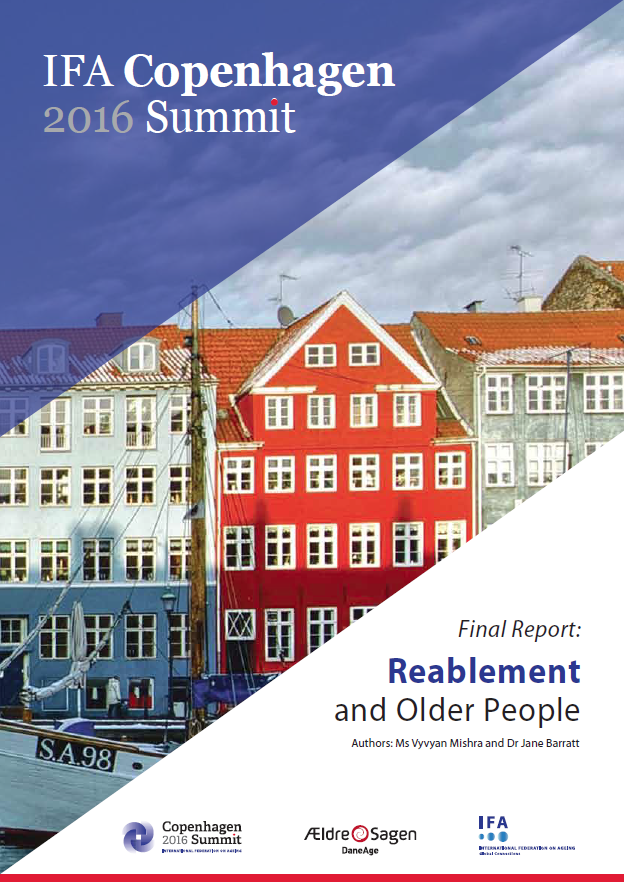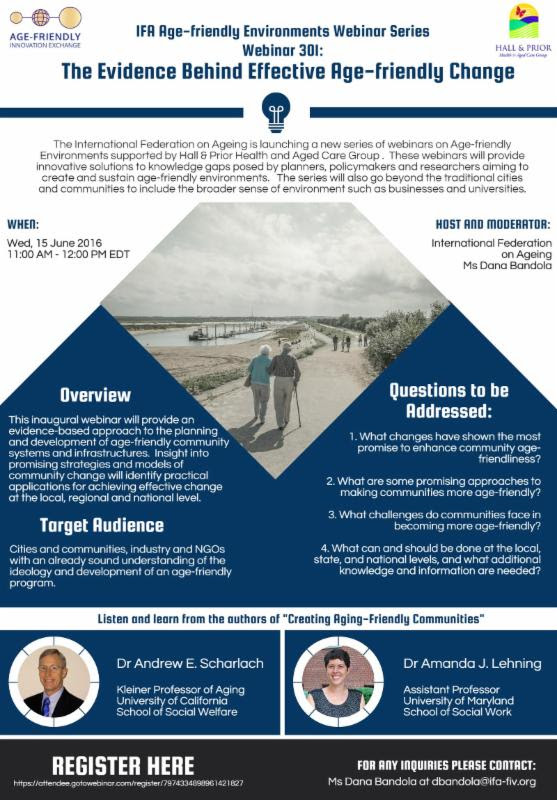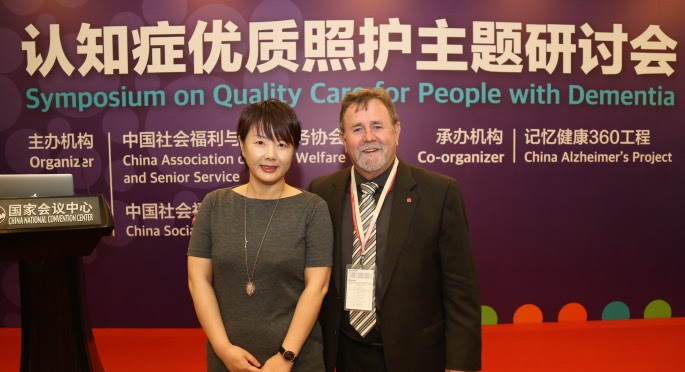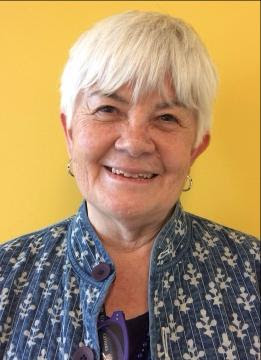| The IFA has been involved in many important projects the past couple of months and has been busy preparing for multiple upcoming initiatives. The May edition of VoltAGE provides important updates on the IFA Copenhagen Summit and the Latin American Adult Immunization Advocacy Summit while also providing information about upcoming projects such as the 13th Global Conference on Ageing and the new Age-friendly webinar series. |
|
|
|
|
13th Global Conference
will bring together world leaders in the field of ageing on 21 — 23 June with the newest Keynote Address to be given by Prof Raina MacIntyre on 21 June.
|
Age-friendly Webinar Series will convene on 15 June from 11:00 am — 12:00 pm EDT. This inaugural webinar will provide an evidence-based approach to strategies and models of community change.
|
Companion Animals Photographic Competition extended deadline will close on 3 June. Submit your photo today for the opportunity to win up to $1000 USD!
|
|
|
Three Weeks Until World Leaders on Ageing Come Together at the IFA 13th Global Conference on Ageing
|
21-23 June 2016 in Brisbane, Australia
World leaders and experts in the fields of ageing, health, policy and more are coming together at the IFA 13th Global Conference on Ageing convening in Brisbane Australia from 21 — 23 June 2016. Don’t miss out on the chance to listen, learn and meet these innovative individuals.
 On 21 June 2016 the Keynote Address will be given by Professor Raina MacIntyre. She is the Head of the School of Public Health and Community Medicine of the University of New South Wales, Professor of Infectious Diseases and Epidemiology, and a Member of the Influenza Specialist Group (ISG). Prof. MacIntyre is internationally recognized for her work on influenza and ischaemic heart disease, adult vaccinations and face masks for preventing respiratory diseases.
Register today for the chance to meet new people and opportunities for collaboration.
Find out more about the sessions and the experts who will be coming to the IFA 13th Global Conference on Ageing and what is in store by viewing the conference program on the IFA Conference website.
|
|
#CompanionAnimals Photographic Competition
Deadline Extension: 3 June 2016
|
The extended submission deadline of 3 June 2016 is fast approaching — don’t miss the opportunity to win up to $1000 USD!
Entries can be submitted by sending your high-resolution photo and a short description on how the animal provides therapeutic benefits to the older adult depicted in the photo to Ms Dana Bandola at dbandola@ifa-fiv.org. With permission, submitted photos will be showcased at the IFA 13th Global Conference on Ageing in Brisbane, Australia from 21-23 June 2016. «[Pet therapy] visits not only bring so much joy and laughter but help to distract from any worries [tenants] may have. As we know hormones and neurotransmitters play a big role when we are doing something that makes us happy. No doubt that oxytocin and dopamine are released when the tenants are visiting with these precious creatures» — Ms. Brenda Hubbard, Contestant.
Visit the IFA website for full details and to view some of the incredible submissions received.
|
|
The Inaugural IFA Copenhagen Summit on
Reablement and Older People
|
 The IFA in partnership with DaneAge convened the inaugural IFA Copenhagen Summit on 17-19 April 2016 in Copenhagen, Denmark. This international, high-level knowledge exchange platform attracted thought leaders and decision makers in government, industry and civil society to explore the applicability of a reablement approach as the 2016 topic of interest. The Summit Program provided an opportunity for insightful speakers to offer an understanding of current frameworks in which reablement can be adopted. Dr John Beard of the World Health Organization (WHO) discussed the paradigm shift from active to healthy ageing while Mayor Ninna Thomsen offered a policy perspective on challenges and reform tracks in Copenhagen. Similarly Mr Peter Hicks explained how The Enabling Society can reshape social policy and Dr Manfred Huber of WHO Europe provided the inclusion of reablement within an age-friendly environment framework.
The IFA Copenhagen Summit Report on Reablement and Older People offers a synthesis of the expert discussion papers generated at the IFA Global Think Tank in October 2015.
Dates are to be released for the 2017 IFA Copenhagen Summit focusing on «the how and why of cognitive reserve for those 50+ years». Please contact Ms Izabella Kaczmarek at ikaczmarek@ifa-fiv.org to be placed on the mailing list for further updates regarding the 2017 IFA Copenhagen Summit.
|
|
Age-friendly Environments Webinar Series:
The Evidence Behind Effective Age-friendly Change
|
15 June 2016 from 11:00 am — 12:00 pm EDT

The International Federation on Ageing is launching a new series of webinars on Age-friendly Environments supported by Hall & Prior Health and Aged Care Group. These webinars will provide innovative solutions to knowledge gaps posed by planners, policymakers and researchers aiming to create and sustain age-friendly environments. The series will also go beyond the traditional cities and communities to include the broader sense of environment such as businesses and universities. This inaugural webinar will provide an evidence-based approach to the planning and development of age-friendly community systems and infrastructures. Insight into promising strategies and models of community change will identify practical applications for achieving effective change at the local, regional and national level.
Listen and learn from the authors of « Creating Aging-Friendly Communities» Dr Andrew Scharlach (Kleiner Professor of Aging at University of California) and Dr Amanda Lehning, (Assistant Professor at University of Maryland).
|
|
New Narrative on Adult Vaccination at the
Latin American Adult Vaccination Advocacy Summit
|
 The current challenge in improving uptake rates of adult vaccination globally is raising awareness for the value of a life course approach to vaccination, and specifically adult vaccination within a public health framework as a key element of healthy ageing. The new narrative needs to focus on a life-course approach to adult vaccinations within a health promotion and disease prevention perspective demonstrating the need for changes in ageist attitudes, beliefs and practices of society, healthcare providers and the broader policy environment of healthcare systems and government.
All Powerpoints in English and Spanish are available on the IFA website along with further information about the Latin American Summit.
|
|
Measuring the Benefits:
The Role of Companion Animals in Long Term Care Facilities
|
The fourth infographic of the Companion Animals Infographic series has been released in connection with International Nurses Day on 12 May to highlight the important role that nurses play in supporting companion animal programs in long term care facilities including patient screening, patient consent, research, guidance and program support.
To view previous infographics in the series, please click here.
|
|
From Plan to Action:
Combating Ageism to Achieve Healthy Ageing
|
Ageism is one of the most impenetrable barriers to action and effective public health policy on healthy ageing. It is pervasive and insidious, and influences behaviours, social values and norms. Too often, older people are disregarded and omitted in data collection, policy development and responses. Ageism must be at the forefront of our collective attention in order to achieve healthy lives for all people everywhere.
At the 69th World Health Assembly the International Federation of Red Cross and Red Crescent Societies (IFRC), HelpAge International and the International Federation on Ageing brought people together in a multisectoral global campaign to actively combat ageism and increase public awareness about the implications of age discrimination for older people and society. Moderated by Dr John Beard of the World Health Organization, and featuring speakers from HelpAge International Tanzania, the Bulgarian Red Cross, the IFA and the Government of Sweden, the side event encouraged people to bring about changes in attitudes, language and behaviour to collectively challenge ageism. Representing the IFA, Mr Greg Shaw presented the following comments:
- As the population ages, the concept of healthy ageing becomes more relevant with the need for health policies and strategies to focus more on prevention and treatment. To re-shape ageing and health policies towards a more healthy ageing perspective, there needs to be an understanding in all levels — individuals, civil society, academics, scientists, healthcare professionals and governments — that one of the main barriers is ageism.
- Ensuring older adults are up-to-date with appropriate vaccinations promotes healthy ageing by reducing unnecessary infections, associated complications and hospitalizations. A new narrative needs to be developed around adult vaccination, health promotion and diseases prevention across the life course that demonstrates that there is a social and economic benefit to invest in the health of older people. Vaccination is a simple preventative tool that is severely underutilized in the older adult populations, where uptake rates for sometimes deadly and debilitating conditions such as pneumonia, influenza and herpes zoster continue to remain well below the recommended rates.
Learn more on this event here.
|
|
Fifth China International Senior Services Expo
|
By Mr. Greg Shaw
Director, International & Corporate Relations, IFA

On the 4 May 2016 I had the honour of presenting the opening remarks at the 5th China International Senior Services Expo at the invitation of the Ministry of Civil Affairs, China National Committee on Ageing, China Association of Social Welfare and Senior Service, Beijing Municipal Civil Affairs Bureau, and Beijing Municipal Committee on Ageing, all of whom constitute partners toward enabling older people to live a productive life.
The China International Senior Services Expo which grows every year responds to a global need, attracts national and international sponsors and exhibitors and is fast becoming ‘the’ expo on seniors globally to attend. The importance of this event was evidenced by France being represented by a delegation of 14 representing a number of service and product providers who recognize the importance of the China market.
The 5th China International Senior Services Expo as with the past Expo’s demonstrate a commitment to advanced technology and creative products and designs, while promoting growth and the development of the senior services industry. Through this Expo, China is undoubtedly a leading force in changing the way we do business for and with seniors.
|
|
Call for IFA Summer Interns!
|
|
|
 |
Do you know of a student or recent grad looking for valuable learning opportunities to help grow their future career? The IFA is currently accepting applications for a summer internship program.
Interns will have the opportunity to be involved in projects related to global ageing issues. The IFA is an international NGO in consultative status with the United Nations and working relations with agencies such as the World Health Organization and has a large global network of partners. As such, there are a multitude of opportunities for active involvement at all levels of operation.
Interns will develop personal and professional goals, which will be reviewed on a regular basis to support the student in acquiring new knowledge and skills.
As ageing is a multisectoral issue, interns from a broad variety of backgrounds are encouraged to apply. The scope of assigned projects will be directly related to the experience of the candidate and the duration of the internship.
If interested in submitting an application, please email Mr Greg Shaw at gshaw@ifa-fiv.org. Please note that at this time, all internships at the IFA are unpaid.
|
|
INTRODUCING NEW IFA UN REPRESENTATIVE
|
|
Ms. Frances Zainoeddin, IFA United Nations Representative
|
 Ms. Frances Zainoeddin is IFA’s newest representative at the United Nations Headquarters in New York. Ms. Zainoeddin left Australia in 1970 to work at the United Nations, New York, initially in the Population Division of the Department of Economic and Social Affairs and ended her career 31 years later as Deputy Budget Director of the United Nations Programme Planning and Budget Division. She has a BA degree. Upon retirement she joined the NGO community in order to further promote the ideals of the United Nations with specific interest in gender and ageing issues.
Ms. Zainoeddin is currently an elected Member-at-Large of the NGO Committee on Ageing and is also a member of the NGO Committee on the Status of Women. Ms. Zainoeddin was a key participant in the establishment of the Stakeholder Group on Ageing in 2013 and was actively engaged in the United Nations intergovernmental negotiations leading up to the adoption of the 2030 Agenda for Sustainable Development ensuring inclusion of the concerns of older persons. She is also actively involved in issues concerning the rights of older persons, particularly in the context of efforts being made at the United Nations to establish a convention to protect and promote the rights of older persons.
|
|
Reablement and What it Means for Global Ageing
|
Guest Blog Contributed By IFA Member Dr Jill Bjerke

Recently I was very fortunate to attend the invitation-only International Federation on Ageing 2016 Summit on «Reablement and Older People» in Copenhagen, Denmark. 17 countries were represented, including China, Australia and Nigeria. During this trip I was able to speak to many high level officials about the Silver Spaces age in place home assessment mobile app I created. This was only recently released and is now being used in over 10 countries. I was the only attendee from the U.S. and experienced an extraordinary opportunity to participate in a dialogue over the definition and goals of reablement. Before this conference, I (probably like you) had never heard the term «reablement». So to put things in proper perspective, I shall use information provided to the conference participants:
«The World Health Organization (WHO) outlines a model of healthy ageing in its 2015
World Report on Ageing and Health that consists of two primary factors: an individual’s intrinsic capacity and functional ability. …Even if an individual’s intrinsic capacity is diminished, the person may be able to do the things that matter to them if they live in a supportive, enabling environment. This reflects the concept of maximizing functional ability, which, according to the WHO is the ultimate goal of healthy ageing.»
|
|
